Kinkajous For Sale
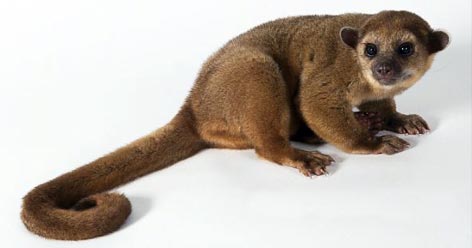
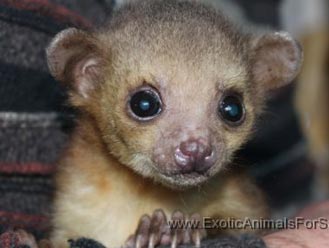
Pet Kinkajou
Kinkajous come in various sizes and there are7 subspecies. The bigger varieties of Kinkajous can reach up to 18 pounds in weight, and about 25 inches in body length. Kinkajous tails can be used when climbing because of their grasping capability, which can almost be up to 45 cm. they are primarily arboreal in nature, but anything goes in captivity. Kinkajous can twist their rear feet backwards, so that the clawed toes can be used when descending head-first. Their palms are bare-skinned and front paws are very sensitive. In water or small openings they often dip their front paws and lick the juice or food off their paws. They have poor vision, and can't sense differences in color, so they mainly rely on their well developed senses of smell and touch. They have no noticeable odor to humans although they have scent glands. Kinkajous also have a broad range of signal calls, from barks and shrill quavering screams to soft chatters. They can live up to 30 years of age.
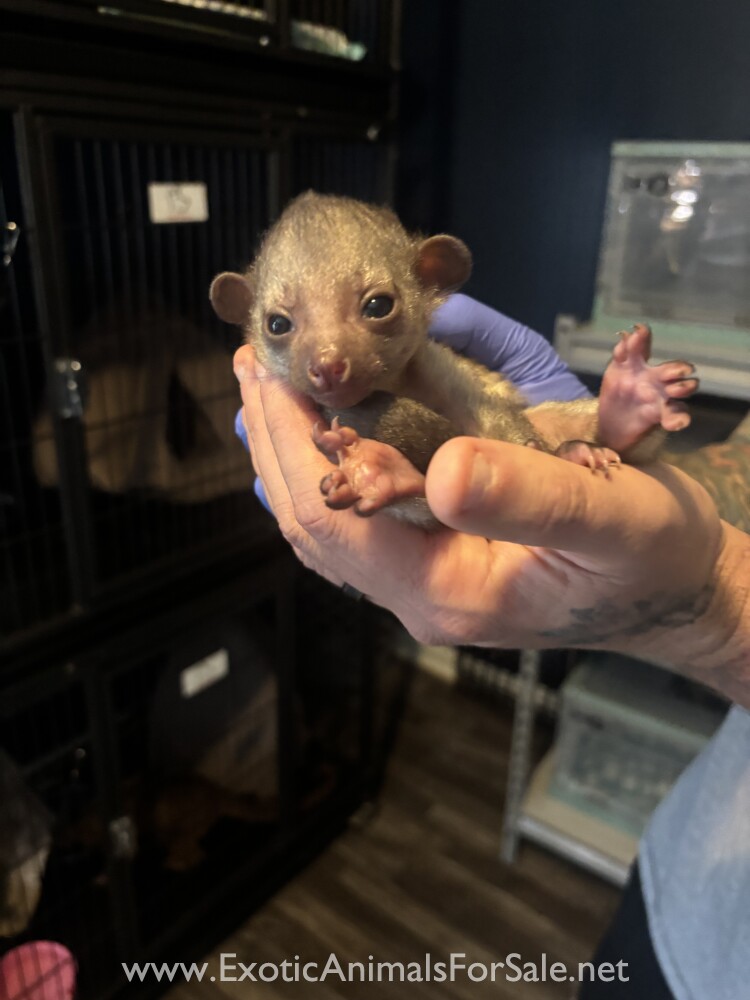
Kinkajou
- Price: $2,000.00
- Name: Jessica Lentz
- Posted: 01/14/2026
- Phone: 9317972310
- Email: Email Seller
- Location: Tennessee
DOB Dec 12. USDA facility
Kinkajou
- Name: Brittany A.
- Posted: 12/21/2025
- Phone: 9372393726
- Email: Email Seller
- Location: Ohio
- Website: Idle-hourranch.com
Beautiful and exceptionally friendly female kinkajou, currently weining. Hands raised and completely socialized and leash trained to be handled and loved daily?. Her name is Ginger and she is an extremely sweet and loving baby. She is looking for her...
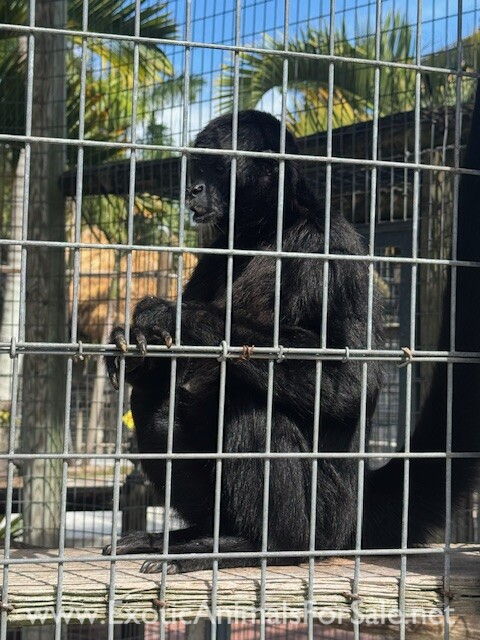
Cappuchins / spider monkeys
- Name: JORGE PEREZ
- Posted: 12/20/2025
- Phone: 3057758056
- Email: Email Seller
- Location: Florida
we have a total of 1 capuchins and 6 spiders available , also 7 kinkajou troop, (1) Howler Monkey ,(4) spot nose all available contact me for prices all adults, 305-775-8056
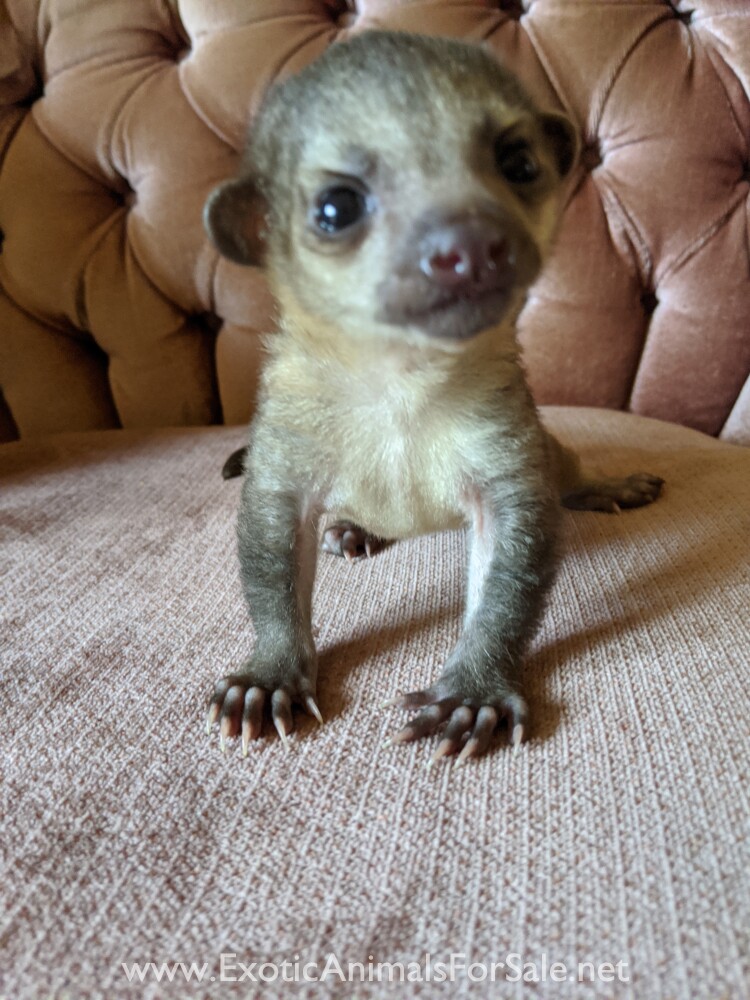
Kinkajou baby girl in CANADA!!
- Name: Ray
- Posted: 11/29/2025
- Email: Email Seller
- Location: Washington
I have a baby girl small variety kinkajou available, baby will be well socialized and get lots of love and spoiled, the pictures are past babies from the same parents to give a representation of color and features. I am in Canada!! Canada pick up on...
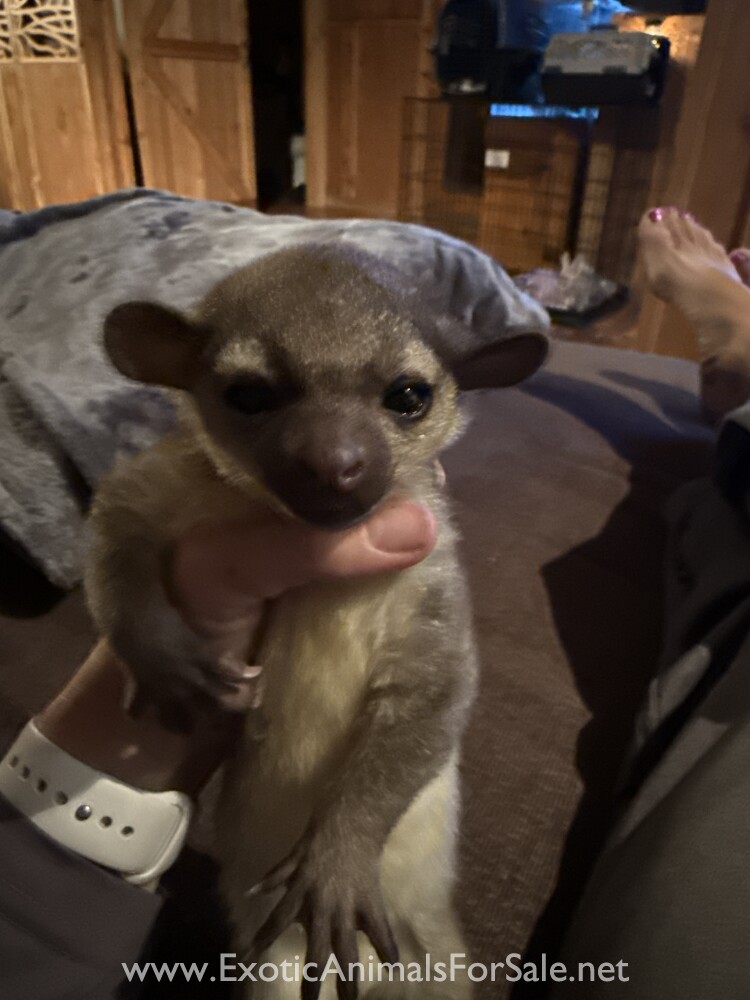
Kinkajou
- Name: Jodi
- Posted: 10/21/2025
- Phone: 4026791160
- Email: Email Seller
- Location: Nebraska
6 week old female kinkajou. Currently on the bottle ready for her new home
sloth
- Name: Gary
- Posted: 10/10/2025
- Phone: 2392890675
- Email: Email Seller
- Location: Florida
sloth prehensile tail porcupine fennec fox sloth prehensile tail porcupine fennec fox kinkajou red footed tortoise
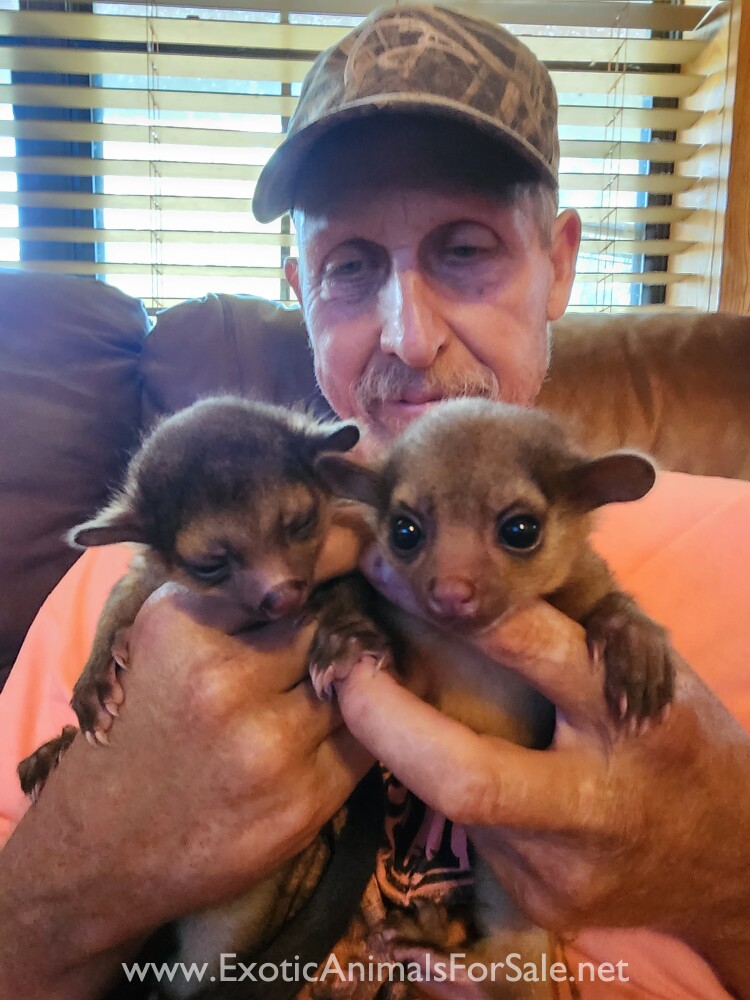
Baby kinkakous in Texas
- Price: 2,500
- Name: Pam
- Posted: 09/20/2025
- Phone: 9035731994
- Email: Email Seller
- Location: Texas
- Website: Texasexoticanimals.com
We have an unrelated pair of kinkajous..may be sold has a pair or individually . Very sweet and tame.. the boy is 7 weeks old abd the girl is 7 weeks and 1 day old. Pick up only in Texas.
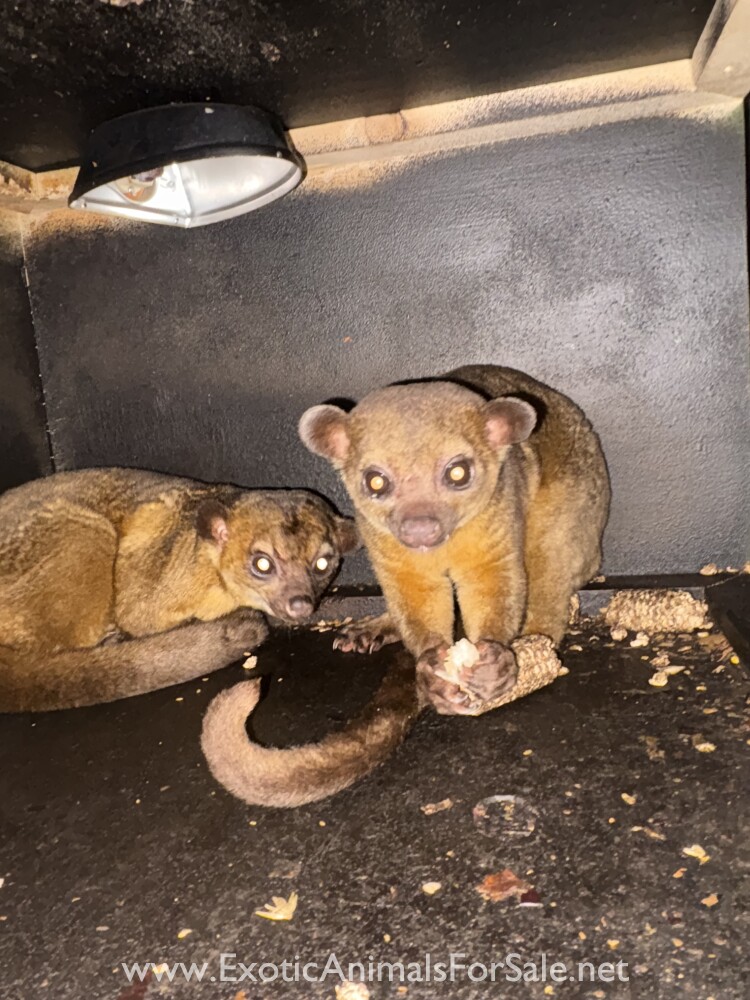
Kinkajou
- Price: $3,500.00
- Name: Kyle Moon
- Posted: 09/18/2025
- Phone: 432-202-8850
- Email: Email Seller
- Location: Texas
Male is 1.5 years old and female is 3 years old kinkajou pair

Kinkajou
- Price: $2,500.00
- Name: Brandon Rose
- Posted: 06/27/2025
- Phone: (502) 353-0235
- Email: Email Seller
- Location: Kentucky
Male kinkajou been bottle raised. Sweet little guy. 5 months old weaned and ready for his new home.
Kinkajou neuterd male
- Name: Ed Laquidara
- Posted: 06/24/2025
- Phone: 9782659691
- Email: Email Seller
- Location: Massachusetts
3yr old male kinkajou, neutered used for educational shows but has become a little picky on who he likes and with a growing young staff i prefer to find him a good forever home

Kinkajou Baby
- Price: $2,500.00
- Name: Kylee
- Posted: 06/18/2025
- Phone: 5632606968
- Email: Email Seller
- Location: Texas
Super sweet little boy. Eating great. USDA licensed facility.

Baby Female Bootlefed Kinkajou
- Price: $2,500.00
- Name: Carol Yonk
- Posted: 05/13/2025
- Phone: 217-825-6131
- Email: Email Seller
- Location: Illinois
Bottle fed and harness trained female Baby Kinkajou Born 12/14/24. I have 30+ years of experience with kinkajous and other exotics and USDA licensed. Please call or text 217-825-6131. Emails will not be responded to.

BABY FEMALE KINKAJOU BOTTLEFED
- Name: Carol Yonk
- Posted: 05/13/2025
- Phone: 217-825-6131
- Email: Email Seller
- Location: Illinois
Bottle fed and harness trained female Baby Kinkajou Born 4/22/25. I have 30+ years of experience with kinkajous and other exotics and USDA licensed. Please call or text 217-825-6131. Emails will not be responded to.
Breeding Kinkajous in Captivity
At 18 to 30 months a kinkajou is sexually mature. At about 1.5 years (about 18 months) Male kinkajous reach sexual maturity, females in 2.5 years (about 30 months). In approximately every three months the female kinkajou goes into heat. They give birth to only one or two cubs per year. The gestation period ranges from three to four months and more often only one cub is born at a time. In the wild they give birth between April and December, and they keep away from each other except when mating. The mating rite comprise of the male nipping and sniffing the female's lower chin and gorge. The male then stimulates the females by using the insides of his writs to rub her sides where he has an enlarged, protruding bone. The female also has this bone but on the male it is not covered with fur.
Kinkajous in captivity can give birth all through the year, to usually one cub and occasionally two. Breeding in captivity can last between 98 to 120 days. The cub is born in a dark den and with grayish hair, its ears and eyes closed, and a bare underside. In general one offspring is produced, but twins do occur occasionally.
Although they are primarily nocturnal and arboreal in the wild, in captivity they will fool around on the ground, and they will sleep well in the night if you spend a lot of time playing and socializing with them in the day. Kinkajous can make wonderful pets because they are beautiful animals, their personalities are sweet, often playful and yet docile. They are often kept in the house without a cage because they are not destructive animals. They are generally docile and quiet, and they have no noticeable odor. Because they are indolent and slow, especially after being woke from a sleep, they don’t particularly like rapid sudden movements. They are non-aggressive and gentle most of the time, although they can get wound up and become quite playful, and pounce on you from high places.
List of Kinkajou subspecies
There are seven subspecies of kinkajou:
- Potos flavus chiriquensis
- Potos flavus chapadensis
- Potos flavus nocturnus
- Potos flavus flavus
- Potos flavus megalotus
- Potos flavus meridensis
- Potos flavus modestus
Kinkajous are indigenous to the warm humid lowland rainforests of south and Central America where temperatures range from the upper 70s to 100 degrees, their housing temperatures should never drop below 70 degrees Fahrenheit.
Housing kinkajous in captivity
During construction the floors of the cage of the floors should be covered with a solid material to prevent damage to the animals’ feet. Kinkajous have a high level of agility and learn by observation. The cages must be protected by key operated locks because they learn to open bolts and other closure devices. The cages must be able to withstand the climbing and digging, therefore it is advisable that the fence have a buried wire fitted at a 90 degree angle to the vertical to avoid the animals tunneling out. Outdoor enclosures must have a roof. If kept outdoors kinkajou should have limitless access to an indoor housing area because they are a tropical species.
Natural lighting is essential for this group of animal, with a regular day and night cycle. Kinkajous are nocturnal and will be most active after dusk. An appropriate form of ventilation must be provided if the animals are kept indoors. The drainage of outdoor enclosures must be able to quickly remove all excess water. Drains should be planned to keep away injuries to the animals, and positioned in a manner not to obstruct their movement. Other than drains that carry surface water, others should be outside the enclosure. Any fecal material must be disposed of in an environmentally sound manner. For indoor enclosures the substrate should be easily cleaned or changeable.
Kinkajous Diet
Fresh fruits and vegetables along with Zupreem monkey biscuits are the main part of a kinkajous diet. Other Treats include fig newton, dates or raisin and graham cracker may be given. Since they are classified as carnivores occasionally a person can add other protein sources such as small amounts of meat like chicken, eggs and hams. Bananas are their favorite fruit, but other fruits can be added. Many people also feed kinkajou with a variety of other foods and sweets in small doses but not chocolates. Citrus fruits are not a proper nutrition to the kinkajou. There is also belief that Kinkajous are allergic to strawberries.
Veterinary care
There are many susceptible diseases to the kinkajou. They need vaccines starting at the age of 6 weeks until about 16 weeks of age, and all the vaccines are boosted annually. They are vaccinated from various diseases such as;
Hepatitis, parvo and Canine distemper Feline panleukopenia LeptospirosisRabies
Internal parasites are a concern and routine fecal exams can give you an idea if they have picked up something that needs to be dealt with specifically. They can carry a specific type of round worm, Baylisascaris, which is very contagious to people and can cause brain and eye damage among other concerns. Because of this they you should be de-wormed regularly even if fecal tests come back negative. Their teeth suffer because of the high sugar contained which makes them build plaque and tartar easily. Regular teeth brushing also benefit them. Teaching a kinkajou to brush requires the same steps as that of a dog or cat.







Comments